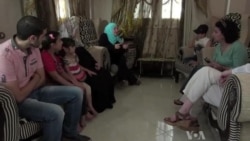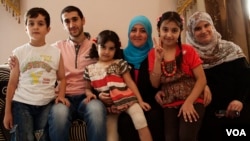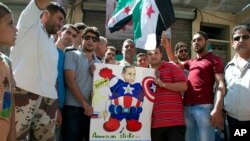CAIRO —
As the international community acts to neutralize Syria's chemical weapons capabilities, some in the Syrian opposition say the brutality of the conventional war is being ignored.
For Syrian activist Soad Khadeya, there is a semblance of normalcy in her new life near Cairo, though the horrors of her homeland are never far away.
Khadeya lived in Ghouta, fleeing a few months before what the United Nations confirms was a sarin attack August 21 on the Damascus suburb.
'Indifference' to killing
But even with that personal connection, she said the international focus on securing Syria's chemical weapons is far too narrow. Hundreds may have died from chemical agents, she argued, but more than 100,000 others have died in “conventional” violence.
The former journalist says how people are killed does not matter, whether it's through chemicals or shelling, fighter jets or public execution. She said “our children are killed by all sorts of weapons, and the world is watching our killing with silence and indifference.”
Khadeya, who has opened her home to other refugees, is glad the United States is pushing for a military option should diplomacy fail.
She said she does not want the United States to merely punish Syrian President Bashar al-Assad for allegedly using the weapons. She wants him gone.
It is not a popular view among many fellow Arabs. Another member of the household, 20-year-old activist Ayman, said public opinion in the Middle East runs strongly against any type of intervention.
Mideast avoidance to intervention
He calls it “embarrassing” that even with continuous scenes of death before their eyes, many oppose a U.S. strike.
Some in the Middle East fear intervention would launch a wider war. Others worry it would unleash the increasingly powerful jihadi elements among the rebels.
Political theorist Christian Donath of the American University in Cairo said, "There are a lot of extremist’s elements in the resistance against Assad, and it is not clear if the U.S. is going to get a much better outcome from those groups compared to the Assad regime."
For moderates like Khadeya, that is okay, even though she said they do not represent the goals of her movement. She said they are different, with different thoughts, but that Syrians need “whoever can defend us. We need whoever can protect us against the world's silence.“
The world is talking now, about chemical weapons. At the same time, the conventional brutality and the extremism it created carry on.
For Syrian activist Soad Khadeya, there is a semblance of normalcy in her new life near Cairo, though the horrors of her homeland are never far away.
Khadeya lived in Ghouta, fleeing a few months before what the United Nations confirms was a sarin attack August 21 on the Damascus suburb.
'Indifference' to killing
But even with that personal connection, she said the international focus on securing Syria's chemical weapons is far too narrow. Hundreds may have died from chemical agents, she argued, but more than 100,000 others have died in “conventional” violence.
The former journalist says how people are killed does not matter, whether it's through chemicals or shelling, fighter jets or public execution. She said “our children are killed by all sorts of weapons, and the world is watching our killing with silence and indifference.”
Khadeya, who has opened her home to other refugees, is glad the United States is pushing for a military option should diplomacy fail.
She said she does not want the United States to merely punish Syrian President Bashar al-Assad for allegedly using the weapons. She wants him gone.
It is not a popular view among many fellow Arabs. Another member of the household, 20-year-old activist Ayman, said public opinion in the Middle East runs strongly against any type of intervention.
Mideast avoidance to intervention
He calls it “embarrassing” that even with continuous scenes of death before their eyes, many oppose a U.S. strike.
Some in the Middle East fear intervention would launch a wider war. Others worry it would unleash the increasingly powerful jihadi elements among the rebels.
Political theorist Christian Donath of the American University in Cairo said, "There are a lot of extremist’s elements in the resistance against Assad, and it is not clear if the U.S. is going to get a much better outcome from those groups compared to the Assad regime."
For moderates like Khadeya, that is okay, even though she said they do not represent the goals of her movement. She said they are different, with different thoughts, but that Syrians need “whoever can defend us. We need whoever can protect us against the world's silence.“
The world is talking now, about chemical weapons. At the same time, the conventional brutality and the extremism it created carry on.








